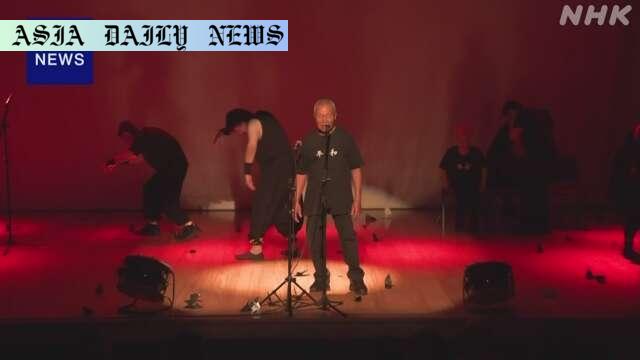Hiroshima Survivors: A touching play in Brazil depicts the stories of atomic bomb survivors to highlight the need for world peace.
A Brazilian stage play depicts the real-life experiences of Hiroshima bombing survivors.
It highlights the stories of Bonkohara Kunihiko and Morita Takashi.
Performances emphasize the importance of peace and a war-free world.
Local audiences reacted positively, considering the play ‘incredible.’

Introduction: Honoring the Survivors of Hiroshima
In an emotionally charged performance staged in Sao Paulo, Brazil, survivor stories of the Hiroshima atomic bombing were brought to life, leaving a lasting impression on audiences. The play not only shed light on the harrowing experiences of survivors but also served as a powerful reminder of the importance of promoting peace and a war-free world. The show, performed in Portuguese, was based on narratives of three survivors who relocated to Brazil after the atrocities of World War II. This initiative stands as a poignant testament to their resilience and determination to educate future generations about the devastating consequences of war.
Testimonies from the Survivors: Stories That Resonate
The play revisited the experiences of Bonkohara Kunihiko and Morita Takashi, two survivors who were directly impacted by the Hiroshima bombing. Kunihiko, now 84 years old, was only five when he was exposed to the fallout of the atomic bombing in 1945. His account vividly portrayed the scenes near ground zero — from people wandering desperately in search of water to the overwhelming destruction that took lives indiscriminately. Such narratives transcend generations and offer chilling reminders of the human cost of war.
Another segment of the play paid tribute to Morita Takashi, who had been a leading member of the survivors’ group before passing away at the age of 100. His role in the play was brought to life by an actor of Japanese descent, further emphasizing the continuity and importance of preserving these memories. Takashi’s testimony and his efforts over the decades to advocate for peace have inspired many to rethink the value of conflict resolution and diplomacy.
Challenges Ahead: Preserving Stories as Time Passes
As the survivors of the bombing age, the group behind the play faces new challenges in continuing its mission. Since its inception in 2013, the group has maintained a commitment to conveying these emotionally impactful stories through theater. Amidst difficulties with dwindling numbers of survivors, they remain resolute in promoting awareness and urging society to embrace peace as a priority.
The Audience’s Perspective: A Generation Responds
Viewers of the Sao Paulo performance shared their reactions, many describing the play as ‘incredible’. A young audience member in her 20s expressed how listening to these powerful survivor narratives reinforced the importance of never forgetting such tragedies. Such responses underscore the intergenerational importance of these cultural initiatives, which aim to leave indelible marks on both conscience and memory.
The Message: Realizing a World Without War
At the heart of the performance lies a profound message: the urgent need to realize and cultivate a world without war. Bonkohara Kunihiko himself expressed his hope for audiences to internalize this call for peace. Against the backdrop of rising global tensions, these stories serve as timely reminders of humanity’s collective responsibility to steer away from conflict and work toward reconciliation and harmony.
Conclusion: The Undying Legacy of Hiroshima’s Survivors
By converting their traumatic experiences into a potent tool for awareness, the survivors and the theater group successfully bridge the past and present. Their efforts not only honor the lives lost during the Hiroshima bombing but also ensure that such horrors are not repeated in the future. This play in Brazil stands as a beacon of hope, courage, and humanity’s potential for change.
Commentary
The Power of Storytelling in Preserving History
The stage play in Brazil, depicting the experiences of Hiroshima bombing survivors, underscores the power of storytelling in ensuring historical tragedies are neither forgotten nor repeated. Art as a medium uniquely captures emotions and perspectives, transforming the personal into a universal call for awareness. With each performance, this group succeeds in bridging generations, bringing history alive in ways that books or lectures often cannot. Such portrayals give newer generations an opportunity to empathize with the pain of the past and cultivate hope for a better future.
The Courage of Hiroshima’s Survivors
The courage and resilience displayed by survivors like Bonkohara Kunihiko and Morita Takashi cannot be overstated. Despite the profound physical and emotional scars left by the bombing, they chose to relive those experiences to educate others. Their stories serve not only as warnings of the atrocities of war but also as testaments to human endurance. Honoring their memory and mission requires collective efforts to amplify their voices through initiatives like this performance.
A Global Responsibility
As time passes and fewer survivors remain to share firsthand accounts, the responsibility rests on us as a global community to remember and uphold their message. Education and cultural activities, like the play performed in Sao Paulo, are vital tools in passing on these lessons. They encourage reflection on how devastating conflicts can be and inspire efforts toward fostering peace and cooperation. In an era of growing geopolitical tensions, such reminders are needed now more than ever.
Conclusion: A Profound Call to Action
The Hiroshima survivors’ legacy is not just a recounting of a tragic past; it is an urgent call to shape a hopeful future. Through performances, memorials, and global discourse, we must ensure their message resonates far and wide. It is imperative that these lessons ignite us into action, fostering a collective commitment to a world built on compassion, understanding, and lasting peace.


